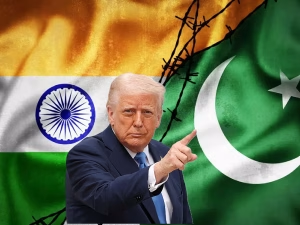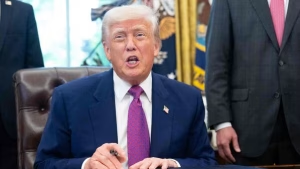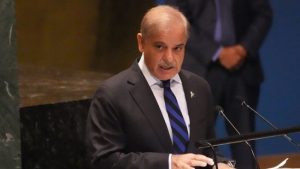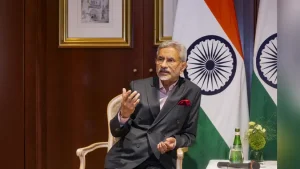New Delhi – US Strategic Affairs Expert Ashley J. Tellis has revealed that President Donald Trump feels “cheated” by India’s denial of American involvement in brokering the May 2025 India-Pakistan ceasefire, providing crucial insight into the escalating tensions that have resulted in unprecedented 50 percent tariffs on Indian goods. The Trump On India Ceasefire controversy has emerged as a significant factor undermining bilateral relations between Washington and New Delhi.
Tellis, who serves as the Tata Chair for Strategic Affairs at the Carnegie Endowment for International Peace, suggests that Trump’s frustration stems from his belief that he deserves credit for resolving the India-Pakistan conflict. The expert’s analysis indicates that Prime Minister Modi’s subsequent phone call to clarify the ceasefire circumstances may have inadvertently worsened the situation rather than resolving the misunderstanding.
Background of May 2025 India-Pakistan Conflict

The Trump On India Ceasefire dispute originated from events following a devastating terror attack in Jammu and Kashmir’s Pahalgam that claimed 26 lives. In response to this attack, India launched ‘Operation Sindoor,’ conducting strategic strikes on terror camps located in Pakistan and Pakistan-occupied Kashmir. This military operation escalated tensions significantly, bringing both nuclear-armed neighbors dangerously close to their fifth war.
The four-day hostilities between India and Pakistan created international concern about potential nuclear conflict, prompting various world leaders to engage diplomatically. The crisis atmosphere provided the backdrop for subsequent claims regarding American mediation efforts that would later fuel the Trump On India Ceasefire controversy.
The timing and intensity of the conflict made it a high-stakes diplomatic situation that naturally attracted international attention and intervention attempts from major powers concerned about regional stability and nuclear escalation risks.
Competing Narratives Over Ceasefire Brokerage

The Trump On India Ceasefire dispute centers on fundamentally different accounts of how the May 10, 2025 ceasefire was achieved. Before either the Indian or Pakistani governments could make formal announcements, President Trump posted on Truth Social claiming that Washington had successfully brokered peace between the two South Asian neighbors.
Trump’s version of events suggests active American mediation that prevented nuclear war between India and Pakistan. The president has consistently maintained this narrative, using it to support his broader claims about ending multiple conflicts worldwide and his pursuit of Nobel Peace Prize recognition.
India’s official position directly contradicts the Trump On India Ceasefire claims, acknowledging that while calls were received from Trump, Vice President JD Vance, and Secretary of State Marco Rubio, the actual ceasefire was established through direct military communication channels. According to New Delhi, the breakthrough came when Pakistan’s Director General of Military Operations contacted his Indian counterpart.
Pakistani Support Versus Indian Denial


The Trump On India Ceasefire narrative has received strong support from Pakistan, which has publicly thanked the Trump administration for its role in the peace process. Pakistani officials have gone so far as to nominate President Trump for the Nobel Peace Prize, recognizing his alleged contribution to preventing nuclear conflict in South Asia.
Also Read: Shehbaz Sharif Meets Putin to Strengthen Pakistan-Russia Relations
This Pakistani endorsement of the Trump On India Ceasefire claims has created an awkward diplomatic triangle, with Islamabad supporting Washington’s version while New Delhi maintains its denial of external mediation. The situation has effectively placed India in opposition to both Pakistan and the United States on this particular issue.
The divergent responses from the two South Asian nations have complicated regional diplomacy and provided Trump with partial validation for his claims, even as India continues to reject any suggestion of American mediation in the ceasefire process.
India’s Firm Rejection of External Mediation


Indian External Affairs Minister Dr. S. Jaishankar has articulated India’s position with particular clarity, describing external intervention in India-Pakistan matters as a “red line” for New Delhi’s foreign policy. His statements emphasize India’s rejection of any claims suggesting that the ceasefire outcome was not negotiated directly between India and Pakistan.
The Trump On India Ceasefire controversy has thus become emblematic of broader Indian concerns about external powers attempting to mediate in bilateral South Asian disputes. India’s consistent position reflects its long-standing policy of preferring direct bilateral engagement with Pakistan rather than involving third-party mediators.
Jaishankar’s characterization of such intervention claims as crossing a red line indicates the depth of Indian sensitivity on this issue and helps explain why the Trump On India Ceasefire dispute has had such significant ramifications for US-India relations.
Economic Retaliation and Tariff Warfare
The Trump On India Ceasefire credit dispute has reportedly contributed to Trump’s decision to impose massive 50 percent tariffs on Indian goods, representing some of the highest trade penalties globally. These tariffs specifically target India for purchasing Russian oil while simultaneously penalizing the country for denying American mediation credit.
Reports suggest that Trump’s frustration over the Trump On India Ceasefire recognition issue has become intertwined with his broader trade agenda and Nobel Peace Prize aspirations. The economic penalties represent a significant escalation in US-India tensions, affecting bilateral trade relationships worth billions of dollars.
The targeting of India while exempting China from similar penalties for Russian oil purchases has raised questions about the consistency of American trade policy and suggests that political considerations related to the ceasefire credit dispute may be influencing economic decisions.
Broader Implications for US-India Relations
The Trump On India Ceasefire controversy has had far-reaching consequences beyond trade disputes, reportedly leading to the cancellation of Trump’s planned visit to India for the Quad Summit 2025. This development represents a significant setback for strategic partnerships in the Indo-Pacific region.
Prime Minister Modi’s participation in the Shanghai Cooperation Organisation summit in China has further irritated Trump administration officials, with the timing appearing particularly problematic given the ongoing tensions over ceasefire credit and tariff disputes.
Democratic leaders have expressed concern that Trump’s approach may push India further away from the United States, potentially undermining decades of strategic partnership building and creating opportunities for rival powers to strengthen their relationships with New Delhi in the increasingly complex geopolitical landscape.

